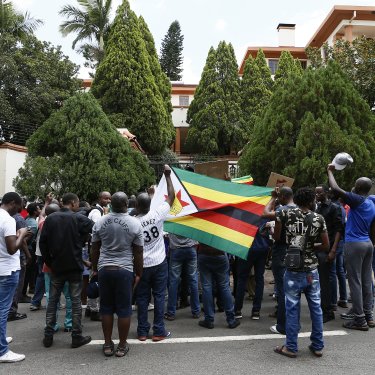Zimbabwe urged to guarantee Internet and social media access, not obstruct reporters during elections

After many press freedom violations in recent months, Reporters Without Borders (RSF) calls on the Zimbabwean authorities to not obstruct journalists’ work during the general elections on 23 August and not arbitrarily suspend the Internet or social media so that Zimbabweans can have access to diverse and reliable reporting.
There are many reasons to be concerned for journalists and for coverage of the elections on 23 August for president, senate and national assembly. The past few months have seen a wide range of press freedom violations, including local reporters repeatedly refused accreditation, international reporters denied entry and adoption of a “Patriot Law” that threatens the right to be informed.
RSF urges the authorities to lift these obstacles and to respect journalists’ work. And it has joined a coalition of 46 civil society organisations in calling on the government to publicly undertake to keep the Internet, social media and other digital communication platforms accessible before, during and after the elections.
In a country that sees many attacks against journalists, especially by ruling party politicians, and has just seen adoption of a so-called 'Patriot Law’ liable to be used to gag the media, concern is high about how events will turn out for journalists on election day. We remind the authorities of the media’s crucial role before, during and after elections and we ask them not to obstruct journalists’ work and to maintain access to the Internet and social media.
Denial of access, physical violence
One of the main problems encountered by journalists in the run-up to the elections has been access – to Zimbabwe and to events. Felix Dlangamandla, a photographer for South Africa’s Daily Maverick news site, was refused accreditation with the Ministry of Information and Broadcasting Services on 17 August. US-based reporters with Voice of America were also denied accreditation, as was a South Africa-based journalist with the German public broadcaster ARD. No reason was given.
In April, five journalists were refused accreditation to cover the First Lady’s visit to the Museum of African Liberation in the capital, Harare. According to the online newspaper NewsDay, reporters with privately-owned media who went to the museum were told by security personnel that only state media were allowed access.
Even more seriously, ruling Zanu PF party members attacked Annahstacia Ndlovu, a reporter for Voice of America Zimbabwe television, as she was covering scuffles between Zanu PF supporters and street vendors in the western city of Bulawayo on 17 July. She sustained an abdominal injury and was forced to delete her videos.
Imprisonment, capital punishment
In addition to these obstacles, an alarming “Patriot Law” that was approved by parliament and signed by the president at the start of June provides for prison sentences and even the death penalty for anyone “wilfully injuring the sovereignty and national interest of Zimbabwe.” Journalists could be convicted for covering opposition meetings regarded as “anti-patriotic” under this controversial law, which is criticised by civil society and the media.
RSF’s concern about Internet and social media access is based on precedent. The Zimbabwean authorities cut the Internet in response to cost of living protests in 2019 and during a rally by the Citizens Coalition For Change, an opposition party, in 2022.
